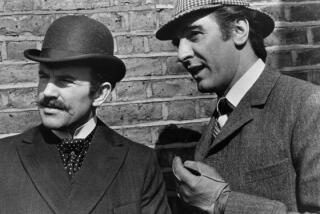Stop, if You Have Heard This One . . .
- Share via
Vance Geier of Highland Park asks what I think about plagiarism in writing and speaking.
I’m against it.
Geier is curious about the subject because of Joseph Biden’s recent withdrawal from the presidential race after someone disclosed that parts of one of his speeches had been plagiarized from a British labor leader.
“In doing research for writing a history,” Geier says, “I came upon the following verse from Rudyard Kipling on ‘the habit of Homer when he smote his blooming lyre’: Folks knew he stole, he knew they knowed / They didn’t tell or make a fuss / But winked at Homer down the road / And he winked back--the same as us. “
So, if we are to believe Kipling, plagiarism is at least as old as Homer.
Geier notes that some alleged scholars insist Shakespeare’s plays were written by someone else. “Indeed,” he says, “we are all plagiarists if the old saying is true--’When you get a new idea, look up the Greek philosophers and see who thought of it first.’ ”
Plagiarism is simply the knowing theft of someone else’s words. It is the tackiest of crimes. It is so easy, though the risk of getting caught is high. It depends on the circulation of the plagiarism. If you plagiarize Byron in a love letter, your inamorata may never know, or never tell. If I were to plagiarize Byron in this column, I would receive a hundred letters indicting me.
I would no more knowingly plagiarize a single line than I would rob a bank. Even if I knowingly use someone else’s felicitous two-word phrase, I always give credit: such is my respect for other writers and my abhorrence of plagiarism.
A few years ago I wrote a column derived from an article in a scientific magazine on why human beings don’t have wheels. I happened to read it in a doctor’s waiting room. I received two or three letters from readers who had seen the original article by chance and accused me of plagiarizing it. True, I had borrowed the idea and quoted liberally from the article, but I found that I had cited the magazine, the name of the article, or the author himself no fewer than 13 times.
More recently, in inventing dialogues between men and women, I quoted, without attribution, a line from a James Thurber cartoon in which a wine buff is telling his guests, “It’s a naive domestic Burgundy without any breeding, but I think you’ll be amused by its presumption.” It is perhaps Thurber’s most famous cartoon line. I had quoted it several times before, always with attribution. I thought it would amuse my readers to recognize its origin without being told. Probably a mistake.
In A Dictionary of Literary Terms (Doubleday), J. A. Cuddon notes that other forms of literary felony, such as conscious or unconscious borrowing, are regarded as “less reprehensible” than outright plagiarism.
All art is derived in part from previous works, he argues. “Men like Raphael do not spring out of the ground.” He points out that the ancient Greeks approved of imitation, and confirms that Homer himself “borrowed” from living ballads.
Cuddon also notes that “self-plagiarism is not uncommon among writers, and is often unconscious.” I confess that I am guilty enough of that--both conscious and unconscious. Over the years I have probably written 5 million words for this space. It would take a man of greater moral fiber than mine to leave that predigested material unrecycled. I do not consider this practice a crime. As George Bernard Shaw said, “I often quote myself: It adds spice to the conversation.”
A less grievous crime than plagiarism, perhaps, is the invention of famous sayings that were never said, or crediting them to the wrong person. Morton Cooper, principal of the TV show “Change Your Voice--Change Your Life,” sends an article by Kenneth L. Calkins, in the Wall Street Journal, urging caution in the attribution of famous quotes.
Calkins notes that Leo Durocher never said, “Nice guys finish last.” The line was written by sportswriter Jimmy Cannon in an article about Durocher. And Vince Lombardi didn’t say, “Winning is not everything; it’s the only thing.” John Wayne said it in a 1953 movie. Nor did W. C. Fields say, “Any man who hates dogs and children can’t be all bad.” Leo Rosten said it of Fields.
As I myself once said, there is no new thing under the sun.
More to Read
The biggest entertainment stories
Get our big stories about Hollywood, film, television, music, arts, culture and more right in your inbox as soon as they publish.
You may occasionally receive promotional content from the Los Angeles Times.










